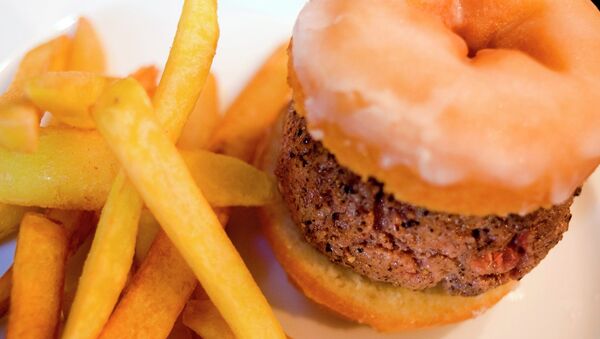Public health messages urge people to eat more fruit and vegetables, cut down on fatty food and take more exercise. High-profile campaigns in the media including celebrity chef Jamie Oliver's ‘School Dinners' TV shows, have tried to persuade school cafeterias to offer healthier options.
And yet, only this week ‘Hungry Horse', an apparently 'family friendly' pub chain with more than two hundred outlets nationwide began serving up a burger that contained almost 100% of a women's recommended daily calorie intake.
The 'Double Doughnut' confection is made with two beef burgers covered in cheese, four bacon rashers, BBQ sauce, all sandwiched between two doughnuts. It contains 1,998 calories.
It also contains 53g of saturated fat, well above the 20g daily allowance for women and 30g for men.
Society's failings?
The public are aware though that food like the 'Double Doughnut' is potentially harmful to their health. However, a new report by the National Bariatric Surgery Registry showed that being aware of the dangers associated with obesity may not be enough. It said that between 2010 and 2013, 550 young people under the age of 25 had weight loss surgery of some kind, 62 of whom were under 18. Nearly 40% of these young men and women were already classified as super-obese (with a BMI of 50 or more). The report said: "It is a reflection on society's failings that these patients had already gained sufficient weight to be broadly comparable to patients who are much older."
After analysing surgical procedures for all age groups, the report found a rise in the number of men undergoing bariatric surgery — up from 16% of all weight-loss operations in 2006 to 26% in 2013.
At the time of surgery, male and female patients were nearly twice the weight they should be for their height, with an average BMI of 48.8.
Food industry power
Campaigners for change in British diets point the finger at the global food industry and its lack of sustainability as the problem behind our increasing waistlines. Aggressive pricing policies and bulk discount offers encourage us to consume more and more, making us think more about ‘getting a good deal' rather than about how much food we actually need to sustain ourselves.
Joan Walley, Sustainable Food Committee chairwoman, told Sputnik News: "Our food system is failing. Obesity and diet-related illness is on the increase, fewer young people are being taught how to cook or grow food, and advertisers are targeting kids with junk food ads on the internet.
"At the same time the world faces growing fears about food security as the global population increases, more people eat meat and dairy, and the climate destabilises as a result of forest destruction and fossil fuel use.
"In many cases, reducing environmental impacts and getting people to eat more healthily can be achieved in tandem.
"The [UK] government does not yet have a strategy that unifies policy areas that impact on food production, supply and demand in a way that drives the system as a whole towards greater sustainability."
Danish diet
A new scheme employed by a Danish paediatrician could be key in making a breakthrough in the battle against childhood obesity in Britain
The project, in the town of Holbaek, has treated 1,900 patients and helped 70% of them to regain and maintain normal weight by adjusting about 20 elements of their lifestyles.
Dr Jens Christian Holm, who runs the scheme said: "In general, obese children are neglected. They are often lonely and many of them don't participate in activities with their peers. They lack self-confidence. With this scheme there is a real hope they can lose weight and have a good quality of life."
As ever, it seems that what we eat can tell us more about what's going on in other areas of our lives, than simply what we put in our shopping trolleys.
The lifestyle strategies employed by the program:
- No crunchy muesli or fruit yoghurts for breakfast — choosing oatmeal, dark brown bread, meat and fish instead
- No fast food or white bread for lunch; choose brown bread, meat, fish and vegetables instead
- Portions served up in the kitchen — no pots and pans at the dining table
- Plate proportions for dinner should be: half vegetables, a quarter brown rice, pasta or potatoes, and a quarter low fat fish or meat
- Wait 20 minutes before having second helpings — this allows time for the body to feel full
- Feel satisfied after each meal
- Only two pieces of fruit per day
- Fast food only once a month
- Sweets only once a week
- Snack only once a week
- Limit juice, iced tea, cocoa, soda or lemonade to once weekly — only half a litre in total
- Cycle or walk to school
- Organised physical activity eg dancing, handball or gymnastics
- Free physical activities like walking/biking after school, walking the dog or trampolining
- Screen time (television, computer or tablet) limited to two hours per day
- No television/computer access until 5pm
- Set a regular, early bedtime

